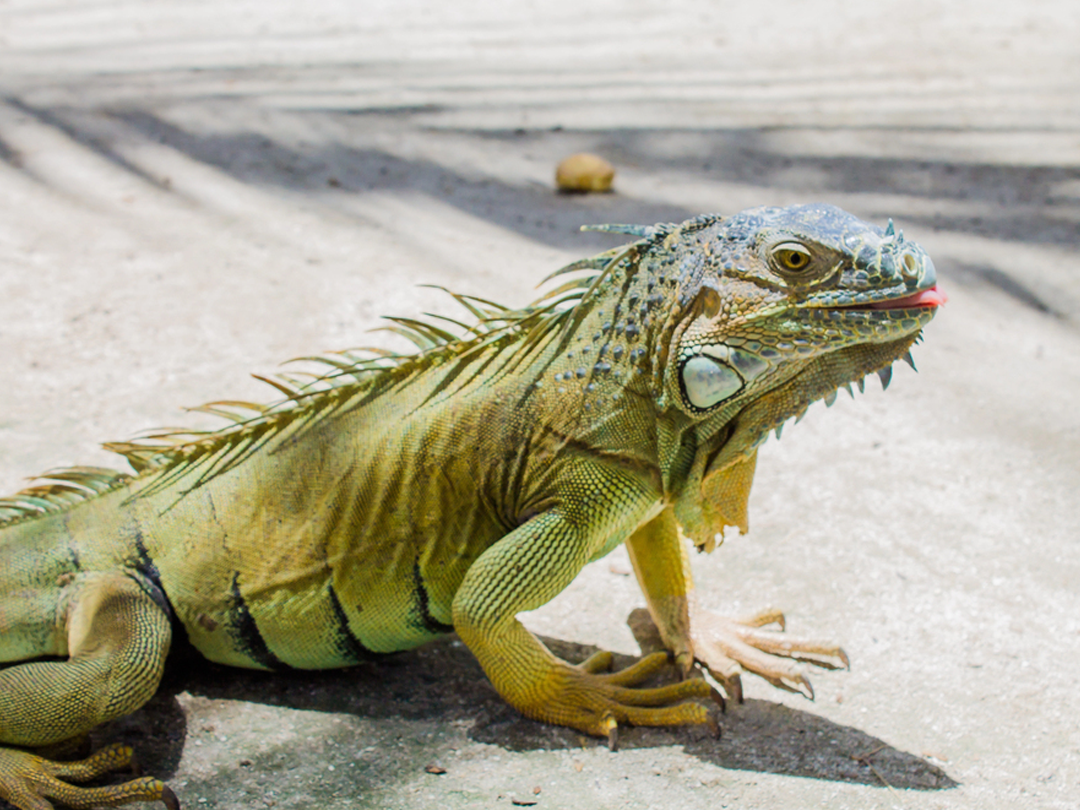Florida Iguana Hunting Guide: Everything You Need To Know

If you’re considering embarking on an exciting adventure in Florida, our Florida iguana hunting guide is a must-read. Whether you’re new to the sport or a seasoned hunter, knowing the ins and outs of iguana hunting in Florida will ensure you have an enjoyable and successful experience. In this guide, we’ll walk you through the Florida iguana hunting laws, tips on how to hunt iguanas, and the overall legality of the sport. By the end, you’ll be well-equipped for your next hunting trip.
Understanding Florida Iguana Hunting
Florida has become a hotspot for iguana hunting as the species has become invasive, damaging ecosystems, properties, and agriculture. These non-native reptiles disrupt natural environments by feeding on vegetation, nesting in sensitive areas, and burrowing into infrastructure like roads and seawalls. As a result, iguana hunting is encouraged to control their population and reduce their impact.
If you’re wondering whether it’s legal to hunt iguanas in Florida, the state not only allows it but encourages it as part of environmental protection efforts. Before heading out, it’s important to familiarize yourself with the laws and guidelines surrounding iguana hunting. This ensures your safety and compliance with regulations that help protect both the environment and the hunters themselves.
Is it Legal to Hunt Iguanas in Florida?
One of the most common questions asked by prospective hunters is, “Is it legal to hunt iguanas in Florida?” The short answer is yes! Iguanas are considered an invasive species in Florida, and the state permits hunters to capture and kill them on both public and private lands. This is part of the state's ongoing efforts to control the population and reduce the damage caused by the species. While there are no specific hunting seasons for iguanas, it’s essential to follow all state laws regarding hunting on private property.
Always ensure you have the necessary permissions from property owners before hunting on their land, as trespassing can result in legal penalties. On public land, certain rules may apply, including restrictions on weapons or specific hunting areas, so it’s important to check local regulations before heading out. Overall, Florida encourages the hunting of iguanas to protect local ecosystems, but hunters must always stay informed about the current laws to ensure they are hunting responsibly and legally.
Florida Iguana Hunting Laws You Need to Know
Florida’s iguana hunting laws are clear but should be followed closely to ensure responsible hunting. The species is not protected, meaning there are no specific hunting seasons or bag limits for iguanas. However, hunters must still abide by general hunting laws, such as avoiding hunting in protected areas like national parks, wildlife refuges, or other designated conservation lands.
Additionally, it is illegal to use poison to hunt iguanas, as this can harm other wildlife and disrupt ecosystems. Iguanas must also be killed humanely, in accordance with state guidelines. Always double-check local ordinances and regulations, as they can vary from county to county, and stay up to date with any changes to ensure you are compliant with all legal requirements.
What Are the Best Times to Hunt Iguanas?
Iguanas are most active during the warm months, especially in the spring and summer when temperatures rise. These reptiles thrive in the heat, and the warmer weather boosts their activity levels. The best time for hunting is early in the morning or late afternoon, as iguanas are typically basking in the sun during these hours to regulate their body temperature. During these times, they are usually more stationary, making them easier targets for hunters.
Understanding their behavior, such as their tendency to climb trees and sunbathe, and their peak activity times can significantly increase your chances of a successful hunt. Additionally, hunting during these hours can help you avoid the midday heat, which can be uncomfortable for both the hunter and the iguana.
Best Equipment for Iguana Hunting
When hunting iguanas, having the right equipment is crucial for both safety and success. A high-powered air rifle is a popular choice due to its accuracy and ability to take down the iguana quickly and humanely, ensuring a clean shot that minimizes suffering. Crossbows and bow-and-arrow setups are also used by some hunters, though they require more skill and practice to aim effectively.
These tools can provide a more traditional hunting experience, but they demand higher precision. Make sure that your gear is not only suitable for the hunt but also in good working condition. Additionally, always carry the necessary tools to process your catch safely, including gloves, knives, and a cooler or storage containers for transporting the meat. Proper preparation with the right equipment will help ensure an efficient and ethical hunt.
Where to Hunt Iguanas in Florida
Iguanas can be found in a wide variety of environments throughout Florida, from urban areas to rural lands, making them accessible for hunters across the state. These reptiles are commonly seen in canals, near waterways, and in residential areas with lush vegetation, where they can bask in the sun and forage for food. They are particularly abundant in areas with ample green space and water sources.
Some of the most well-known spots for hunting iguanas include Miami, Fort Lauderdale, and parts of the Florida Keys, which are known for their high population of these invasive reptiles. However, it’s important to note that some areas may have specific regulations or restrictions on hunting. Before heading out to hunt in a particular location, always check with local authorities to ensure you’re in compliance with any local laws, ordinances, or requirements that may vary by county or city. This will help you avoid legal issues and ensure a safe, responsible hunt.
Tips for a Successful Iguana Hunt
Success in iguana hunting largely depends on preparation, so it’s essential to be thorough and strategic in your approach. Start by scouting your hunting area carefully and looking for signs of iguana activity, such as droppings, tracks, or areas where they’ve been feeding. Pay attention to their preferred habitats, such as sunny spots with abundant vegetation. Once you’ve located your target, it's crucial to remain patient and quiet to avoid startling the iguana.
Iguanas are naturally skittish, but they tend to freeze when they sense a threat, which can give you an opportunity to move closer. If you approach slowly and steadily, maintaining a low profile, you may be able to get within range for a clean shot. Additionally, using the wind to your advantage can help mask your scent, making it easier to get closer without alerting the iguana. By staying calm and being persistent, you increase your chances of a successful hunt.
Iguana Hunting Safety Tips
Safety should always be your top priority while hunting. Always wear protective clothing, including sturdy footwear and gloves. Iguanas have sharp claws and teeth, so be cautious when handling them to avoid injury. Make sure you’re familiar with the area where you’re hunting and watch out for potential hazards like snakes, alligators, or other wildlife that may pose a risk.
Stay alert for any environmental dangers such as unstable ground or dense brush. Lastly, if you’re hunting in a group, maintain clear communication and ensure everyone is following safety protocols to prevent accidents and ensure a safe, successful hunt.
How to Prepare Iguanas After the Hunt
After successfully hunting an iguana, it’s important to properly process the animal to ensure it’s handled safely and ethically. First, ensure that the iguana has been killed humanely, following the appropriate methods to avoid unnecessary suffering. Once the animal has been dispatched, the next step is to carefully remove the skin. This process can be tricky, so using a sharp knife and taking your time will help ensure that the meat underneath remains intact. Once the skin is removed, you can use the meat for cooking or other purposes.
Many hunters enjoy preparing iguana meat in traditional dishes, with popular options including stews, soups, and tacos. The meat is lean and can be a great source of protein, offering a unique flavor and texture. Additionally, some hunters use the skin for crafting or other practical uses. Be sure to properly store and cook the meat to avoid any contamination and enjoy the full benefits of your hunt.
Benefits of Iguana Hunting in Florida
Iguana hunting in Florida offers several benefits. Not only does it help control the population of this invasive species, but it’s also an enjoyable and rewarding outdoor activity. Whether you’re hunting for sport or for meat, the experience allows you to engage with nature and contribute to environmental conservation. As you prepare for your Florida iguana hunting adventure, it’s crucial to understand the laws, techniques, and equipment needed for a successful hunt. Knowing when and where to hunt, as well as how to do so safely, is key to ensuring a rewarding experience.
Trophy Gator Hunts is here to help, offering expertly guided hunting experiences for both iguana and alligator hunts. With our in-depth knowledge and specialized equipment, we ensure that each hunt is executed with precision and safety in mind. Trust us to provide competitive pricing and year-round opportunities, making your next hunting adventure not only exciting but also successful. We offer the expertise and support you need for a memorable, professional hunting experience.

